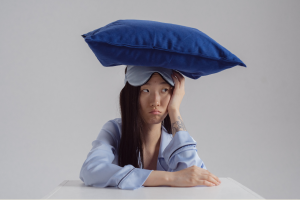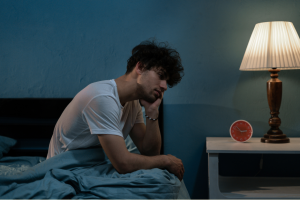Insomnia
 Insomnia is a prevalent issue that affects millions of people worldwide. The impact of insomnia extends beyond nighttime discomfort, influencing overall well-being, productivity, and mental health.
Insomnia is a prevalent issue that affects millions of people worldwide. The impact of insomnia extends beyond nighttime discomfort, influencing overall well-being, productivity, and mental health.
Insomnia is a sleep disorder characterized by persistent difficulties initiating or maintaining sleep, leading to impaired daytime functioning. Individuals with insomnia may experience trouble falling asleep, waking up frequently during the night, or waking up too early and being unable to go back to sleep. This condition can be short-term (acute) or long-term (chronic), and it often takes a toll on both physical and mental health.
Causes of Insomnia
- Stress and Anxiety: Overwhelming stress or anxiety can interfere with the ability to relax and fall asleep. Several psychological and physiological factors contribute to the onset and perpetuation of insomnia, such as anxious-ruminative personality traits, stressful events, age-related sleep homeostasis weakening mechanisms, and biologic–genetic diathesis of CNS hyperarousal.[1]
- Poor Sleep Habits: Irregular sleep schedules, exposure to electronic devices before bedtime, and an uncomfortable sleep environment can contribute to insomnia. Sleep patterns (same article as the first paragraph) are affected by age, gender, living conditions, exercise, and workload.[2]
- Medical Conditions: Chronic pain, respiratory disorders, and hormonal imbalances can disrupt sleep patterns.
- Mental Health Issues: Conditions such as depression and post-traumatic stress disorder (PTSD) are often linked to insomnia.
- Medications: Some medications may have side effects that interfere with sleep. Study shows that the concurrent use of medications with insomnia as a potential side effect has increased considerably in the past two decades. Between 1999 and 2016, the use of one and two or more medications with insomnia side effects increased by 66% and 164%, respectively.[3]
How to Avoid Insomnia?

- Establish a Sleep Routine: Maintain a consistent sleep schedule, going to bed and waking up at the same time every day. In general, keeping a consistent sleep/wake schedule, even on the weekends, is important. Staying up and sleeping in much later on work days changes the pattern of light exposure and can delay the circadian clock, making it harder to fall asleep and wake up on subsequent work days.[4]
- Create a Relaxing Bedtime Routine: Insomnia patients often display high levels of physiologic, cognitive, and/or emotional arousal, both at night and during the daytime. Engage in calming activities before bed, such as reading or practicing relaxation techniques.[5]
- Limit Stimulants: Reduce the intake of caffeine and nicotine, especially in the hours leading up to bedtime. Stimuli same with the article in the last paragraph) associated with sleep become discriminative stimuli for the occurrence of reinforcement. Difficulty in falling asleep, or in returning to sleep after awakening, may be due to inadequate stimulus control.[6]
- Optimize Sleep Environment: Create a comfortable and dark sleep environment, keeping electronic devices out of the bedroom. Research findings show that light is a major synchronizer of circadian rhythm and sleeping with the light on has an impact on sleep quality, causing shallow sleep.[7]
Relieving Insomnia
- Cognitive Behavioral Therapy for Insomnia (CBT-I): CBT-I is a structured program that helps individuals identify and replace thoughts and behaviors that cause or worsen sleep problems.[8]
- Medications: In some cases, prescription or over-the-counter sleep medications may be recommended for short-term relief. The FDA has approved an array of prescription medications for the treatment of insomnia, including BZD and non-BZD drugs, the melatonin agonist ramelteon, the sedating antidepressant doxepin, and the orexin receptor antagonist suvorexant.[9]
- Relaxation Techniques: Practices such as deep breathing, meditation, and progressive muscle relaxation can promote relaxation and improve sleep.
How Acupuncture and Chinese Herbal Medicine Help Insomnia?
- Regulating the Sleep-Wake Cycle: Acupuncture may help regulate the circadian rhythm, promoting a more consistent sleep-wake cycle. A study showed that acupuncture of sleep-Sanyinjiao could effectively improve sleep quality and upregulate serum γ-aminobutyric acid (GABA) and 5-HT levels in patients. (Wenkang L, Luo B, Yuqiu L. Effect of insomnia acupoint prescription combined with umbilicus inner ring acupoint acupuncture on the expression of 5-HT _ (1A) R and 5-HT _ (2A) R in hippocampus of PCPA model rats. Western Chin Med. 2022;35:34–7) please find link of this article
- Reducing Stress and Anxiety: Acupuncture sessions can induce a state of relaxation, reducing stress and anxiety levels that contribute to insomnia.[10]
- Balancing Energy Flow: According to traditional Chinese medicine principles, acupuncture helps balance the flow of energy or “qi” in the body, addressing imbalances in organ systems that may disrupt sleep.
Chinese herbal medicine complements acupuncture in the holistic treatment of insomnia, offering a natural and personalized approach to enhancing sleep quality. Utilizing a variety of herbs known for their calming and sleep-promoting properties, Chinese herbal medicine works synergistically with acupuncture to address the underlying causes of insomnia. Here’s how it contributes to overcoming sleep disturbances:
- Enhancing Neurotransmitter Function: Certain Chinese herbs can help increase the production of neurotransmitters associated with relaxation and sleep, such as GABA and serotonin, aiding in the natural sleep process.[11]
- Harmonizing the Yin and Yang: In traditional Chinese medicine, insomnia is often seen as an imbalance between the fundamental forces of yin (calmness and restoration) and yang (activity and energy). Chinese herbs are selected to nourish yin and subdue excess yang, fostering a peaceful state conducive to sleep.
- Addressing Internal Imbalances: Chinese herbal formulas are tailored to the individual’s specific pattern of disharmony, whether it’s due to internal heat, qi deficiency, or blood stagnation. By targeting these imbalances, herbs work to rectify the root cause of insomnia.
Visit us at Happipuncture Clinic for Insomnia
At Happipuncture, we address insomnia not just as a symptom, but as a signal from your body seeking balance and restoration. Our expert practitioners employ a harmonious blend of acupuncture and Chinese herbal medicine, tailored to your unique condition, to gently guide you back to natural, restful sleep. Imagine drifting into a peaceful night’s sleep, supported by natural methods that not only soothe your mind but also rejuvenate your body’s energy flow. Contact our team at Happipuncture or call 09-2182992.




